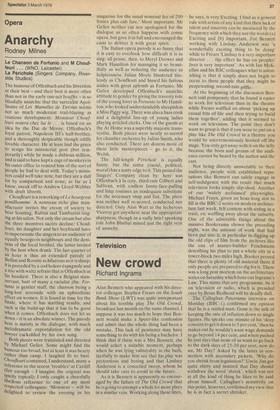Anarchy
Rodney Milnes
Le Chanson de Fortunio and M Chouf leuri (WNO, Leicester) La Reich°le (Singers' Company, Riverside Studios) The humour of Offenbach and his librettists at their best — and their best is more often than not in the early one-act bouffes —is so blissfully anarchic that the surrealist Apollinaire of Les Mamelles de Tiresias seems not so much modernist trail-blazing as cautious development. Monsieur Choufleuri restera chez lui le . . . is based on an idea by the Duc de Morny, Offenbach's loyal patron, Napoleon III's half-brother, and a thoroughly despicable though oddly lovable character. He at least had the grace to resign his ministerial post (but temporarily) while he made a dubious million, and is said to have kept a cage of monkeys in his outer office to remind him of the sort of People he had to deal with. Today's ministers could well take note, but they are a dull lot by comparison and none, as far as I know, sneak off to Andrew Lloyd-Webber With draft libretti.
Choufleuri is a reworking of Le bourgeois gentilhomme. A nouveau riche glue manufacturer invites the cream of society to hear Sonntag, Rubini and Tamburini singing at his salon. Not only the cream but also the three monstres sacres decline: Choufleuri, his daughter and her boyfriend have to impersonate the singers to an audience of equally bourgeois neighbours and the denizens of the local brothel, the latter invited by the host when drunk. The last quarter of an hour is thus an extended parody of Bellini and Rossini as hilarious as it is sharp; it is preceded by a cod bolero espagnole and a trio with waltz refrain that is Offenbach at his headiest. There is also a Belgian manservant, butt of many a .racialist jibe. Fortunio is gentler stuff, the chanson being a long-lost serenade with an aphrodisiac effect on women. It is found in time for the finale, where it has startling results, and such is the build-up that it has to be good When it comes. Offenbach does not let us down — it is an absolute winner. The parody here is mainly in the dialogue, with much Melodramatic expostulation for the old lawyer cuckolded by his Own song.
Both pieces were translated and directed by Michael Geliot. Some might find the humour too broad, but at least it was hearty rather than camp. I laughed fit to bust. Choufleuri contained, I understand, many a reference to the recent 'troubles' at Cardiff (fair enough — I imagine the original was Spicily topical); I only caught a cheerfully libellous reference to one of my most respected colleagues: `Monsieur — will be delighted to review the evening in his magazine for the usual nominal fee of 200 francs plus cab fare.' Most important, Mr Geliot neither cut nor apologized for the dialogue as so often happens with comic opera, but gave it in full and encouraged the casts to deliver it with great spirit.
The Italian opera parody is so funny that it is easy to overlook how difficult it is to sing: all praise, then, to Meryl Drower and Mark Hamilton for managing it so beautifully as well as reducing the audience to helplessness. Julian Moyle blustered tirelessly as Choufleuri and hissed his furious asides with great aplomb as Fortunio. Mr Geliot developed Offenbach's anarchic attitude to gender by giving the travesty role of the young lover in Fortunio to Mr Hamilton, who looked understandably sheepish in a Miss Piggy wig. There was also a bass cook and a delightful line-up of young ladies playing articled clerks. One of the guests at the At Home was a superbly majestic transvestite. Both pieces were neatly re-scored for chamber orchestra by Julian Smith, who also conducted. There are dozens more of these little masterpieces — go to it, the Welsh.
The full-length Perichole is equally funny, but the satire (racial, political, moral) has a nasty edge to it. This passed the Singers' Company clean by: here was Offenbach a la cosy, third-rate Gilbert and Sullivan, with endless funny-face-pulling and limp routines an inadequate substitute for the necessary snap and fizz. The piece was neither well re-scored, conducted nor directed. Only Alan Watt as the lecherous Viceroy got anywhere near the appropriate sharpness, though in a sadly brief speaking role John Bluthal mined just the right vein of anarchy.


































 Previous page
Previous page